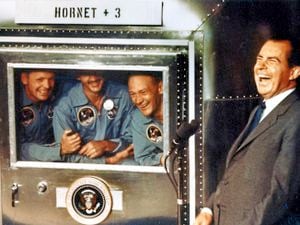How Apollo 11 helped invent the modern PC
Bill McCarthy chronicles the rise and rise of the humble laptop

It’s more than half a century since Neil Armstrong stepped down from Apollo 11 onto the surface of the moon with the immortal words: “That’s one small step for a man, one giant leap for mankind.”
Those of us who were around at the time marvelled at what was happening on July 20, 1969. As a youngster I was thinking: Is it real? How could it have happened?
The technology, just a few years earlier would have been impossible to achieve. But humankind’s ingenuity seems to know no bounds.
From the very early days of the Chinese inventing gunpowder, through to the invention of the clock, the first printing press and communication via telegraph, the telephone, electricity, radio and TV, things have really gathered pace since the moon landing.
The Apollo programme was initiated in 1961 when then President Kennedy said he wanted to put a man on the moon ‘before the decade is out’. His ambition was realised although he never lived to see it. The technology led to spin-offs like, water purification, polymers, Teflon, cordless tools, the first mini computer – and ultimately, the laptop.
Things moved on and we saw innovations like the invention of the CT scanner in medicine in the 1970s, the first mobile phones in the 1980s, though they were barely mobile being the size of a brick, and then the internet in the 1990s.
Computers back in moon landing days were the size of a wardrobe or bigger, but it is now believed that the latest smartphones have up to 100,000 times the processing power of the computer that did the donkey work on Apollo 11.
Since then we have seen the growth of DNA sequencing and in the last few years the advent of Artificial Intelligence, another quantum leap forward in the world of technology.
But arguably the most important inventions so far, is the development of the PC and subsequently the laptop and the cloud.
So what is the cloud? Simply put it is still the internet, but it allows you to store your information on a series of linked computers rather than on your desktop or laptop. It is also where web-based email services are stored together with file storage, to free up computer memory, or data sharing. They are instantly accessible and particularly beneficial for business, where they have revolutionised the way we work.
The likes of Facebook and Instagram are effectively web-based applications or apps, which can be accessed from anywhere with a smartphone, computer or laptop.
These web-based developments and the effects of the pandemic is when many individuals and businesses began to fully embrace the power of the laptop and cloud. Cloud applications can be updated, tested and deployed quickly, helping businesses develop their operations at speed. In addition, simplified operations and infrastructure management can be outsourced to third-party cloud providers.
There is more security for data and apps can be leased rather than splashing out large amounts on software that might not suit your needs completely.
A seemingly everyday, humble piece of equipment, the laptop has literally changed the world. Because of the high levels of memory and processor power, laptops can now be used for running a business and memory-consuming purposes such as gaming and video streaming, without suffering the curse of buffering.’ Split screens also allow multi-tasking.
Many ‘traditional’ work methods no longer exist due to the introduction of enhanced tools and techniques, and with the pandemic, working from home.
That has transformed businesses, not only for employees, who can get a better work-life balance, but also for employers, who, in some circumstances can abandon the office altogether and work from home, a high street cafe or restaurant or even while chilling on the beach.
While bigger screens are still vital for many office functions, the laptop and the cloud now mean the office can be anywhere. This also allows staff members access to central databases and technology like Zoom, Teams or WhatsApp, allows virtual conferencing with the office team and clients.
The effects have been felt in education during the pandemic. Many schools switched to online teaching, by providing laptops to students. This also had the bonus of enhancing the computer skills in students. While returning to the office is still a must for many, the rail strikes have shown that this kind of flexibility can keep the wheels of industry in the UK turning when businesses are disrupted.
Many have now adopted the hybrid form of working, with a few days in the office and a couple working from home, or vice versa. What is demonstrated is that what previously was thought of as only an office-based function has become the new normal for many. The debate rages over the benefits. Clearly, there are savings for staff, who can cut travelling and expense and are able to spend more time at home.
The downside is the extra costs in power and heating in the home. Employers can downsize their offices and make savings on utility bills, allowing extra profits to be invested into the business.
While security is not really an issue with working from home, security risks may grow, so firms must be on their guard in future and look for proper protection from hacking and malware.
The home working effect has been felt in the high streets where service businesses have suffered and commercial landlords are seeing buildings left empty as are some of the major shops, also badly hit by the boom in internet shopping.
Many of these areas are now being addressed, with moves to accommodate multi businesses and apartments within former department stores, and plans for Government, local government and local enterprises to take over buildings for community use.
The human touch is still important and the workplace remains a place of collaboration and spontaneity. It is still a place for working together and developing new ideas and solving problems.
All in all, laptops have enhanced our lives in many ways and with the rise of artificial intelligence, who knows what is still to come?
When Neil Armstrong made that first historic step on the moon, he could not have known how right he was about the future.





